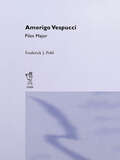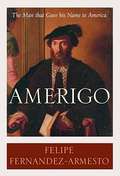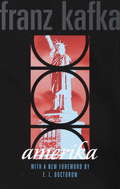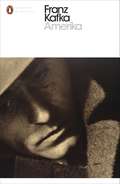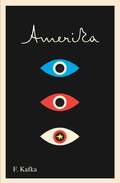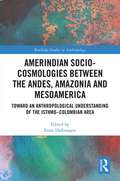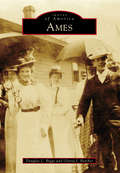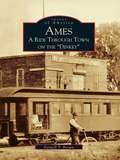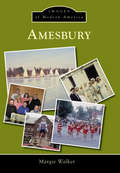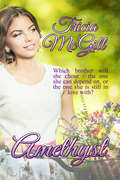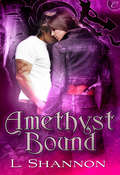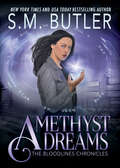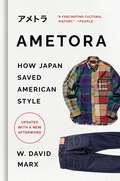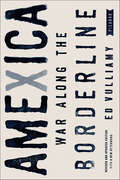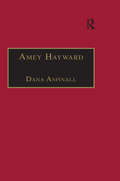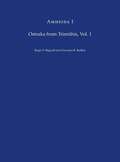- Table View
- List View
Amerigo Vespucci Pilot Cb: Amerigo Vespucci Pilot Ma
by Frederick Julius PohlFirst published in 1967
Amerigo: The Man Who Gave His Name to America
by Felipe Fernández-ArmestoIn this biography of the man for whom America is named, historian Fernandez-Armesto delves into life and explorations of Amerigo Vespucci. Vespucci was a prominent self-promoter in the 15th century and Fernandez-Armesto successfully narrates his achievements in this book which in 2007 marked the 500th anniversary of the naming of America.
Amerika
by Brauna E. PounsWithout warning, on a quiet Tuesday morning, the Russians took the headiest gamble in the history of warfare by launching a nuclear attack against America. But this attack was no storybook Armageddon of mushroom clouds bursting over cities, of scalded millions murdered in their homes. This was a new sort of war, conceived in shocking simplicity by Soviet scientists. The premise: don't attack targets. Attacking targets, after all, even with nuclear missiles, was essentially as primitive as throwing stones. What mattered was not the individual bases and silos, but rather the electronic network that linked them as an effective whole. The key, then, was to attack and disable the communication systems among the targets, thereby crippling the entire system.
Amerika
by Franz KafkaTranslated by Willa and Edwin MuirForeword by E. L. DoctorowAfterword by Max Brod Kafka's first and funniest novel, Amerika tells the story of the young immigrant Karl Rossmann who, after an embarrassing sexual misadventure, finds himself "packed off to America" by his parents. Expected to redeem himself in this magical land of opportunity, young Karl is swept up instead in a whirlwind of dizzying reversals, strange escapades, and picaresque adventures. Although Kafka never visited America, images of its vast landscape, dangers, and opportunities inspired this saga of the "golden land." Here is a startlingly modern, fantastic and visionary tale of America "as a place no one has yet seen, in a historical period that can't be identified," writes E. L. Doctorow in his new foreword. "Kafka made his novel from his own mind's mythic elements," Doctorow explains, "and the research data that caught his eye were bent like rays in a field of gravity."
Amerika (Penguin Modern Classics)
by Franz KafkaKarl Rossman has been banished by his parents to America, following a family scandal. There, with unquenchable optimism, he throws himself into the strange experiences that lie before him as he slowly makes his way into the interior of the great continent. Although Kafka's first novel (begun in 1911 and never finished), can be read as a menacing allegory of modern life, it is also infused with a quite un-Kafkaesque blitheness and sunniness, brought to life in this lyrical translation that returns to the original manuscript of the book.
Amerika: The Missing Person
by Franz KafkaFranz Kafka's diaries and letters suggest that his fascination with America grew out of a desire to break away from his native Prague, even if only in his imagination. Kafka died before he could finish what he like to call his "American novel,: but he clearly entitled itDer Verschollene("The Missing Person") in a letter to his fiancee, Felice Bauer, in 1912. Kafka began writing the novel that fall and wrote until the last completed chapter in 1914, but in wasn't until 1927, three years after his death, thatAmerika--the title that Kafka's friend and literary executor Max Brod gave his edited version of the unfinished manuscript--was published in Germany by Kurt Wolff Verlag. An English translation by Willa and Edwin Muir was published in Great Britain in 1932 and in the United States in 1946. Over the last thirty years, an international team of Kafka scholars has been working on German-language critical editions of all of Kafka's writings, going back to the original manuscripts and notes, correcting transcription errors, and removing Brod's editorial and stylistic interventions to create texts that are as close as possible to the way the author left them. With the same expert balance of precision and nuance that marked his award-winning translation ofThe Castle,Mark Harman now restores the humor ad particularity of language in his translation of the critical edition ofDer Verschollene. Here is the story of young Karl Rossman, who, following an incident involving a housemaid, is banished by his parents to America. With unquenchable optimism and in the company of two comic-sinister companions, he throws himself into misadventure, eventually heading towards Oklahoma, where a career in the theater beckons. Though we can never know how Kafka planned to end the novel, Harman's superb translation allows us to appreciate, as closely as possible, what Kafka did commit to the page. From the Hardcover edition.
Amerindian Socio-Cosmologies between the Andes, Amazonia and Mesoamerica: Toward an Anthropological Understanding of the Isthmo-Colombian Area (Routledge Studies in Anthropology)
by Ernst HalbmayerThis book offers a new anthropological understanding of the socio-cosmological and ontological characteristics of the Isthmo–Colombian Area, beyond established theories for Amazonia, the Andes and Mesoamerica. It focuses on a core region that has been largely neglected by comparative anthropology in recent decades. Centering on relations between Chibchan groups and their neighbors, the contributions consider prevailing socio-cosmological principles and their relationship to Amazonian animism and Mesoamerican and Andean analogism. Classical notions of area homogeneity are reconsidered and the book formulates an overarching proposal for how to make sense of the heterogeneity of the region’s indigenous groups. Drawing on original fieldwork and comparative analysis, the volume provides a valuable anthropological addition to archaeological and linguistic knowledge of the Isthmo・Colombian Area.
Amerithrax
by Robert GraysmithThe first book on the unsolved case that terrorized a nation in the aftermath of September 11th is now updated with new material, including photos and transcripts of original anthrax letters that were received by NBC Nightly News anchor Tom Brokaw and Senate Majority Leader Tom Daschle.
Ameritopia
by Mark R. LevinAN INTELLECTUALLY BRACING NEW VOLUME ON AMERICA'S TRANSFORMATION AND THE CLASH BETWEEN CONSTITUTIONALISM AND UTOPIANISM--FROM THE AUTHOR OF THE #1 NEW YORK TIMES BESTSELLER LIBERTY & TYRANNY , MARK R. LEVIN Hailed by Rush Limbaugh as "the most compelling defense of freedom for our time," and "the necessary book of the Obama era" by The American Spectator, Mark R. Levin's Liberty and Tyranny made the most persuasive case for conservatism and against statism in a generation. In this most crucial time, this leading conservative thinker explores the psychology, motivations, and history of the utopian movement, its architects, and its modern-day disciples--and how the individual and American society are being devoured by it. Levin asks, what is this utopian force that both allures a free people and destroys them? Levin digs deep into the past and draws astoundingly relevant parallels to contemporary America from Plato's Republic Thomas More's Utopia Thomas Hobbes's Leviathan Karl Marx's Communist Manifesto . . . as well as from the critical works of John Locke, Charles Montesquieu, Alexis de Tocqueville, and other philosophical pioneers who brilliantly diagnosed the nature of man and government. As Levin meticulously pursues his subject, the reader joins him in an enlightening and compelling journey. And in the end, Levin's message is clear: the American republic is in great peril. The people must now choose between utopianism or liberty. President Ronald Reagan warned, "freedom is never more than one generation away from extinction." Levin agrees, and with Ameritopia, delivers another modern political classic, an indispensable guide for America in our time and in the future.
Ames (Images of America)
by Gloria J. Betcher Douglas L. BiggsAmes began as two communities. At its founding in 1864, Ames Station, on the Chicago & North Western Railway's main line, lay two miles east of Iowa Agricultural College, across the Squaw Creek. When the Ames & College Railway joined the college to the town in 1891, a cooperative spirit emerged that exists to this day. A rich history of achievements and colorful characters marks Ames's 150 years. One founding father commanded the 20th US Colored Infantry in the Civil War, while a Confederate veteran served as commander of the Iowa State College corps of cadets. Physicists at Iowa State College developed the uranium refinement process for the first atomic bomb and established the Ames Laboratory, the smallest US Department of Energy National Laboratory. Companies like Collegiate Manufacturing made material for the soldiers in World War II, and Kingland Systems now stands among global leaders in reference data software. Ames's businesses, citizens, and institutions, past and present, have created a rich community heritage for a vibrant, 21st-century city.
Ames: A Ride Through Town on the "Dinkey" (Images of America)
by Farwell T. BrownAmes has been referred to as a railroad town; more correctly the railroad established itself at the same moment that Iowa Agricultural College, now Iowa State University, was taking form. While the railroad helped to develop Ames, it was the college that drew people with names like Welch, Beardshear, "Tama Jim" Wilson, Charles F. Curtiss, and their successors. The flourishing academic community also drew families like the Loughrans and the Tildens, who were attracted by the positive town-gown relationship.In Ames: A Ride Through Town on the "Dinkey," readers will meet some of these people and tour historic Ames, as the narrow-gauge train nicknamed the "Dinkey" weaves its way through the city's history in over 220 vintage photographs. The images in this book, featuring people and landmarks both past and present, include Ames native J. Herman Banning, the first African-American aviator to be licensed in the U.S.; the dramatic 1922 burning and destruction of the Iowa State College Armory; a rare image of the 1895 Iowa State football team, the first to be called the Cyclones; and finally, downtown Ames' growth from dirt streets with wooden sidewalks to a modern college town.
Amesbury (Images of Modern America)
by Margie WalkerIn 1968, Amesbury celebrated its 300th anniversary. Residents compiled a cookbook, commemorative coins were sold, dances and plays were held, and townspeople dressed in period costume as part of the many events for the town's tercentenary. Since then, Amesbury has grown considerably, with many new businesses--furniture makers, fine food products, Norman's Restaurant, and clothing shops--emerging. Old mills have been reinvented into spaces for artists, photographers, and other creative outlets. The downtown area has been redeveloped and is a welcoming site as one enters Amesbury. One only needs to sit in Market Square, stroll along the Riverwalk, watch the falls of the Powow River in the Millyard, or listen to a concert in the amphitheater to experience Amesbury's charm. Despite a 1996 vote changing the town into a city, this great community retains the same small-town feel it has held for so many years.
Amethyst
by Tricia McGillLove comes in many guises. Although Amy cares for Tony, and in the small country town where they live they are considered a couple, Amy still carries a torch for Tony’s older brother who spurned her adolescent avowals of love.
Amethyst Bound
by L. ShannonToni Giovanni is a thief. . . although she prefers to call it the high-risk recovery business. Her current job feels suspiciously easy-until a mysterious artifact draws her into an ancient prophecy and binds her soul to a spirited dragon named Amethyst. But Toni isn't quite ready to be taken over by a dragon, even if Amethyst's appetite for sexy archaeologist Dr. Ben Davis mirrors Toni's own. And she's got a big problem on her hands: turns out the prophecy predicts that dragons will end the world. . . and there are many more dragons out there. Toni's going to need all the help she can get.
Amethyst Dreams
by Phyllis A. WhitneyNicholas Trench's granddaughter vanished years ago. He hopes her friend Hallie can unravel the mystery. As she searches, Hallie reexamines her life.
Amethyst Dreams (Bloodlines Chronicles #1)
by S. M. ButlerNicola Casimir returned home from World War III a war hero, though she wasn’t exactly given a hero’s welcome and she didn’t want one. As a “collector” of magical artifacts, Nicola found an outlet for the guilt and resentment she carried as a result of her actions during the war. The thefts and schemes she carried out eventually landed her in prison, where she was content to live out her life. When her old mentor and commanding officer comes to visit with an ultimatum that her conscience can’t take, she turns to the only man she knows that can’t be bought or coerced: the federal agent who pursued and arrested her. Embroiled in a conflict that turns out to be a lot bigger than she originally thought, Nicola must somehow find a way to navigate through it and come out on the other side unscathed.
Ametora: How Japan Saved American Style
by W. David MarxLook closely at any typically "American" article of clothing these days, and you may be surprised to see a Japanese label inside. From high-end denim to oxford button-downs, Japanese designers have taken the classic American look--known as ametora, or "American traditional"--and turned it into a huge business for companies like Uniqlo, Kamakura Shirts, Evisu, and Kapital. This phenomenon is part of a long dialogue between Japanese and American fashion; in fact, many of the basic items and traditions of the modern American wardrobe are alive and well today thanks to the stewardship of Japanese consumers and fashion cognoscenti, who ritualized and preserved these American styles during periods when they were out of vogue in their native land. In Ametora, cultural historian W. David Marx traces the Japanese assimilation of American fashion over the past hundred and fifty years, showing how Japanese trendsetters and entrepreneurs mimicked, adapted, imported, and ultimately perfected American style, dramatically reshaping not only Japan's culture but also our own in the process.
Amexica: War Along the Borderline
by Ed VulliamyAmexica is the harrowing story of the extraordinary terror unfolding along the U.S.-Mexico border—"a country in its own right, which belongs to both the United States and Mexico, yet neither"—as the narco-war escalates to a fever pitch there.In 2009, after reporting from the border for many years, Ed Vulliamy traveled the frontier from the Pacific coast to the Gulf of Mexico, from Tijuana to Matamoros, a journey through a kaleidoscopic landscape of corruption and all-out civil war, but also of beauty and joy and resilience. He describes in revelatory detail how the narco gangs work; the smuggling of people, weapons, and drugs back and forth across the border; middle-class flight from Mexico and an American celebrity culture that is feeding the violence; the interrelated economies of drugs and the maquiladora factories; the ruthless, systematic murder of young women in Ciudad Juarez. Heroes, villains, and victims—the brave and rogue police, priests, women, and journalists fighting the violence; the gangs and their freelance killers; the dead and the devastated—all come to life in this singular book.Amexica takes us far beyond today's headlines. It is a street-level portrait, by turns horrific and sublime, of a place and people in a time of war as much as of the war itself.
Amey Hayward: Printed Writings 1641–1700: Series II, Part Two, Volume 4 (The Early Modern Englishwoman: A Facsimile Library of Essential Works & Printed Writings, 1641-1700: Series II, Part Two #Pt. 2)
by Dana AspinallThe Females Legacy is the only surviving work of Amey Howard about whom very little is known. While rarely political or even topical, The Females Legacy generally conforms to much of the same militantly Protestant ideology of the sort Harris spent his life advocating. The volume contains twenty-six devotional poems nearly all of which feature a male speaker. Some are 'meditations' in which the speaker considers the import of an Old or New Testament narrative. Others are 'dialogues' between speakers who grapple with a sudden realisation of their own sinful natures and a biblical figure who introduces them to Christ's redemptive majesty. Interspersed amongst these two kinds of verse are a few other poems which directly address women or deploy them as protagonists. This edition reproduces the sole surviving copy of The Females Legacy held in the British Library.
Amgen Inc.'s Epogen--Commercializing the First Biotech Blockbuster Drug
by Felix Oberholzer-Gee Dennis YaoAmgen Inc.'s Epogen was the first biotech blockbuster drug. Epogen helped prevent anemia, a condition that leads to severe fatigue, increased risk of cardiovascular disease, and even death. At the time, the market for Epogen, which included dialysis patients and persons with cancer undergoing chemotherapy, was estimated to be a $1 billion opportunity. After a critical scientific breakthrough, which allowed Amgen to identify the EPO gene, the company applied for a number of patents to protect its achievement. However, much to its surprise, Amgen learned that EPO had already been patented. Genetics Institute, the holder of the patent, demanded a royalty-free cross-license. Amgen's manager needed to decide how best to compete with its rival.
Amgen, Inc.: Planning the Unplannable
by Nitin Nohria James D. BerkleyBy the early 1990s, Amgen--a pharmaceutical company started little over a decade ago as Applied Molecular Genetics--was within range of becoming a billion-dollar company. With two extremely successful biotechnology drugs on the market, Amgen stood as the largest and most powerful independent company of its type in the world. Top executives in the company viewed long-range planning as an important ingredient in the firm's success; many others--including some of the firm's scientists--were less sure. With Amgen's sales expected to continue to grow rapidly, the firm's long-range planning process would be put to the test. Shows the different, sometimes paradoxical perspectives held within a single, dynamically changing company toward the issue of long-range planning. Students are challenged to synthesize these views into a coherent picture of a firm's growth amid great uncertainty.
Amheida I: Ostraka from Trimithis, Volume 1 (ISAW Monographs #7)
by Roger S. Bagnall Giovanni R. RuffiniThis volume presents 455 inscribed pottery fragments, or ostraka,found during NYU’s excavations at Amheida in the western desert of Egypt. Themajority date to the Late Roman period (3rd to 4th century AD), a time of rapidsocial change in Egypt and the ancient Mediterranean generally. Amheida was asmall administrative center, and the full publication of these brief textsilluminates the role of writing in the daily lives of its inhabitants. Thesubjects covered by the Amheida ostraka include the distribution of food, theadministration of wells, the commercial lives of inhabitants, their education,and other aspects of life neglected in literary sources. The authors provide afull introduction to the technical aspects of terminology and chronology, whilealso situating this important evidence in its historical, social and regionalcontext. Online edition available as part of the NYU Library's Ancient World Digital Library and in partnership with the Institute for the Study of the Ancient World (ISAW).
